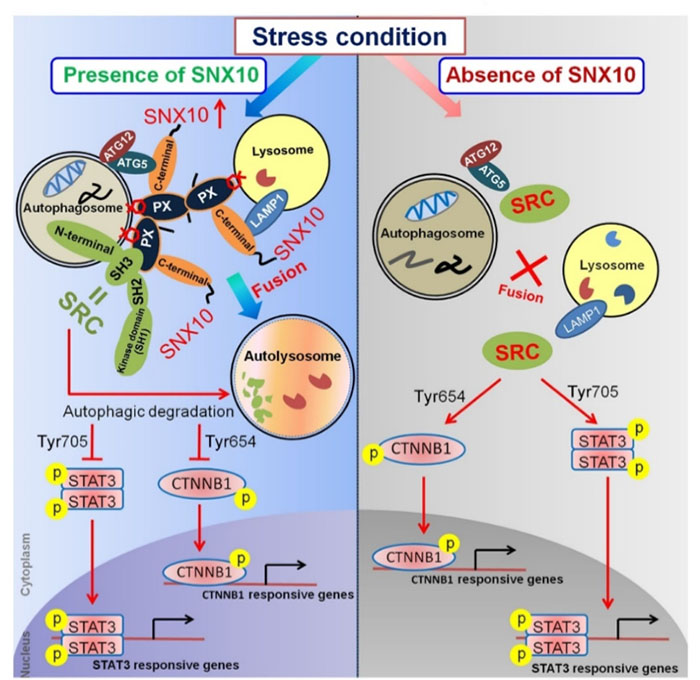
Recently, the team of Professor Xiaoyan Shen (School of Pharmacy, Fudan University) in collaboration with the team of Zheng Mingyue, a researcher at the Chinese Academy of Sciences Shanghai Institute of Materia Medica, has made new progress in the field of autophagy and colorectal cancer. On June 17, the research results were published online in Autophagy under the heading of “SNX10 (sorting nexin 10) inhibits colorectal cancer initiation and progression by controlling autophagic degradation of SRC”.
Colorectal cancer is one of the most common malignant diseases in developed countries as well as in developing countries, and its morbidity and mortality is at the top of various malignancies. In 2018, the global incidence of colorectal cancer ranked third among all kinds of malignant tumors and the mortality rate ranked second. Therefore, exploring the pathogenesis of colorectal cancer and searching for effective strategies to prevent and treat this disease is urgently needed all over the world. Although it has been reported that genetic mutations and changes in genetic background contributed to the development and progression of colorectal cancer, the key mechanisms involved remain largely unknown.
Autophagy is closely related to the occurrence and development of tumors. Previous studies have shown that autophagy is a "double-edged sword" for tumors. Autophagy can significantly inhibit the growth and proliferation of colorectal cancer cells and induce apoptosis of colorectal cancer cells. However, autophagy can also provide additional energy to colorectal cancer cells to promote their abnormal proliferation, and reduce the effectiveness of various treatments for colorectal cancer. Therefore, the exact role of autophagy in the development and progression of colorectal cancer remains to be further elucidated.
The non-receptor tyrosine kinase SRC is a key mediator of cellular protumorigenic signals. SRC is aberrantly overexpressed and activated in more than 80% of colorectal cancer patients, which is closely related to the progression of the disease. The research team found that SNX10 plays an important regulatory role in the process of autophagosome-lysosome fusion. SNX10 deletion led to the inability of SRC to be recruited to autolysosomes for degradation, resulting in a large accumulation of SRC in cells and further activation of downstream STAT3 and CTNNB1 signaling pathways, which ultimately promoted the development and progression of colorectal cancer in mice. The study also found that SNX10 expression was significantly reduced in human colorectal cancer tissues and was closely related to SRC accumulation and activation, tumor differentiation, TNM stage, lymph node metastasis and survival period. This study firstly discovered and revealed the important role of SNX10 in the regulation of SRC autophagic degradation pathway, and provided new ideas for the prevention and treatment of colorectal cancer. At the same time, this study also shown that autophagy is an important anti-cancer mechanism in cancer early stage, suggesting that anti-autophagy therapies may have adverse effects on promoting cancer occurrence. A study published in Nature recently, also confirmed the important role of autophagy in the development of cancer, is consistent with the findings of the research group.

Schematic: SNX10 inhibits the initiation and progression of colorectal cancer by controlling autophagic degradation of SRC
Zhang Sulin, gradated Ph.D. student of School of Pharmacy, Fudan University and post-doctoral researcher of Chinese Academy of Sciences Shanghai Institute of Materia Medica, is the first author of the paper. Professor Xiaoyan Shen and Professor Mingyue Zheng are the Co-corresponding authors. The research was supported by National Natural Science Foundation of China, China Postdoctoral Science Foundation, and Shanghai Sailing Program.
Article link:https://www.tandfonline.com/doi/full/10.1080/15548627.2019.1632122